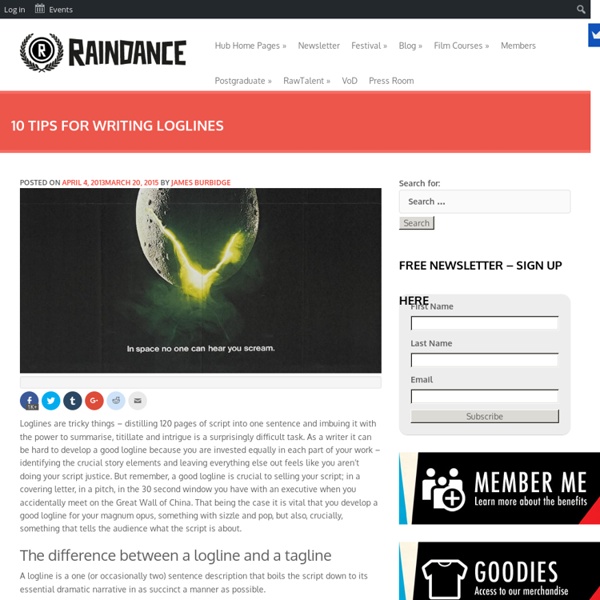10 Tips for Writing Loglines

Short Film Production Fund
Welcome to Eric Chang's Official Website - Réminiscence
Strange Tips To Get You Writing
I’m writing this because I cannot start writing. So many times I jot down a script idea - a character, a setting, an inciting incident – but nothing becomes of these. Instead, I procrastinate. Sound familiar? Yet, somewhere in this procrastination my mind thought up some wacky ways to start writing that I think I’ll try and could be useful for you, fellow screenwriters. Some may seem incredibly obvious, but hopefully some new things will be discovered. So sit back, relax and enjoy the strange ideas I’ve conjured up (then after reading this, immediately put them into action) Do not just explore, get lost. Do your research. Go back in time. Shut down your pc/mac, delete your scriptwriting software, it’s time to pick up pen and paper or invest in a typewriter. Don't just come up with a character, become your character. This is so silly, this is so daft. Use your senses. Do not go to a place and scribble down what you see. Don’t just ask ‘what if’ but ask ‘so what?’ This one speaks for itself.
Welcome to the New Media Film Festival
Fund Your Art, Event & Career — The Grove Center for the Arts & Media
What we can sponsor In order to be considered for a Creative Funding grant from The Grove, your art projects must be consistent with our mission of cultivating the spiritual life and creative work of artists. We don't offer verbal or written critiques to judge the artistic merit of your work, but we reserve the right to accept only those projects in alignment with our non-profit mission. If your project is not a good fit with The Grove, we'd be happy to recommend other funding organizations to better serve you as an artist. To be considered for The Grove Creative Funding Program... 1. 2. 3. 4. What We Can't Sponsor... The Grove cannot sponsor the following: 1. 2. 3. After I'm approved, what are my next steps? Once approved, you sign the Grove Creative Funding grant agreement. 1. 2. 3. What Does it Cost? The Grove receives a 10% fee from all donations, which includes discounted Paypal fees (3% average). Please review our Creative Funding Agreement for complete details. Free Webinar!
Roy W. Dean Film GrantsFrom the Heart
The Roy W. Dean Film Grants funds independent feature films, documentaries, web series, and short films that are unique and make a contribution to society that, without its help, might otherwise never get made. Roy W. There are 3 Roy W. Winners of the Roy W. All grant applicants are entitled to a free 15 minute consultation. After the grant you’ve applied for has closed and your materials have been reviewed, you can schedule an appointment. Now Accepting Applications for 2016 Fall Grant Deadline: September 30th, 2016 (All applications must be POSTMARKED by the deadline. $3,500.00 from From the Heart Productions40% deduction on color, editing, and sound & all production services… including our lighting truck.
NYWIFT | Fund for Women Filmmakers
NYWIFT solicits donations annually to provide funding to women filmmakers. Funds are used to match grants made through our funding programs: The Loreen Arbus Disability Awareness GrantIn-Kind Post Production GrantsThe Nancy Malone Marketing & Promotion GrantThe Ravenal Foundation Feature Film Grant Summer submission deadlines vary. Please click on links above for more information. Help women filmmakers tell their stories!
A home for your amazing ... - Home
Related:



